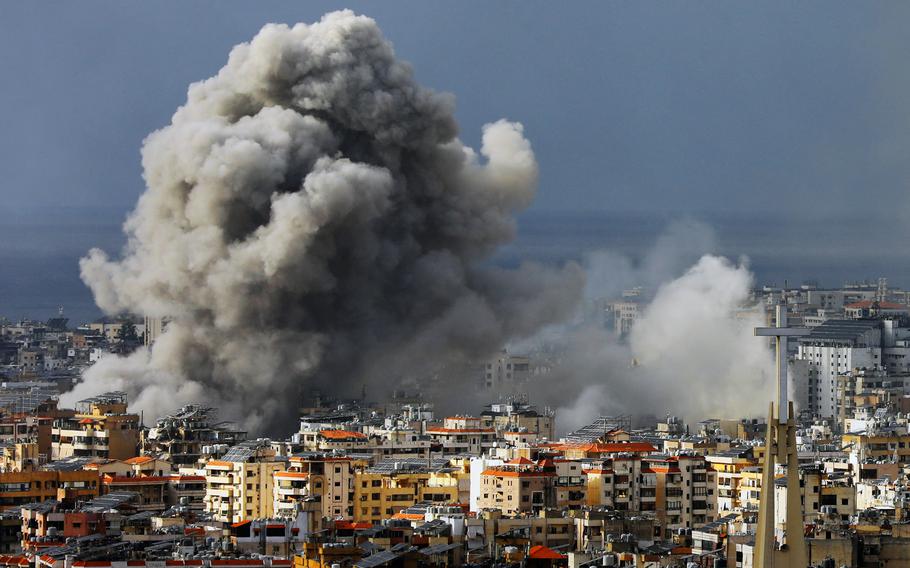
Smoke rises over Beirut's southern suburbs on Nov. 25, 2024, after Israeli airstrikes. (AFP/Getty Images/TNS)
(Tribune News Service) — Israel and Hezbollah inched closer to signing a ceasefire deal that may be concluded in the coming days, according to officials and people familiar with the matter, even as the two sides continued to fire artillery and rockets at each other.
Israel’s security cabinet is expected to vote on an agreement Tuesday, and passage is considered likely, according to an Israeli official, who asked not to be identified discussing internal deliberations. That could pave the way for the U.S. and France, which have mediated the talks, to announce it immediately, the official said.
U.S. and French officials on Monday both said there had been significant progress but cautioned that there was still work to be done. Earlier Monday, National Security Council spokesman John Kirby said the two sides were still working through procedural elements and “nothing is negotiated until everything is negotiated.”
“We are close to a deal,” the Israeli ambassador to the U.S., Michael Herzog, told Israel’s Army Radio on Monday, adding that some final points still needed to be addressed. “It could happen within days.”
Axios reported earlier that the security cabinet would convene Tuesday to approve the deal.
The U.S. would help oversee enforcement of a 60-day suspension of hostilities during which Hezbollah fighters would move north of the Litani River, about 19 miles away from the Israeli border, two Israeli officials said. The enforcement requires monitoring that Hezbollah militants also don’t bring any more Iranian weapons into Lebanon. Israel reserves the right to respond if it sees breaches of the agreement that aren’t properly addressed — one aspect of the deal that received significant pushback.
The Israeli shekel strengthened 1.7% against the dollar on Monday — its best performance in around a month — and oil prices dropped on optimism a deal would ease tensions in the Middle East.
Still, there have been similar predictions by other Israeli and U.S. officials in recent weeks about an agreement being imminent, and it remains unclear if Hezbollah will accept a deal. Over the course of the separate war in the Gaza Strip, U.S. officials frequently said in public a deal was close, only to have the negotiations scuttled by disagreements.
The Iran-backed group has been severely weakened after two months of increased Israeli sabotage, air strikes and ground incursions in southern Lebanon. But it’s still able to fire rockets into Israel on a daily basis and put up some resistance against Israeli ground forces.
On Sunday, Hezbollah fired at least 250 rockets and drones into Israel, wounding several people, and the Israeli air force struck targets in Lebanon.
In Israel, a far-right coalition member, National Security Minister Itamar Ben-Gvir, came out against the proposed truce. He said it would be a “missed opportunity” to crush Hezbollah, a militia group that is ideologically committed to Israel’s destruction. But Prime Minister Benjamin Netanyahu may still be able to secure cabinet support even without Ben-Gvir’s approval.
The two sides have been in conflict since Hezbollah began striking Israeli territory in October last year in solidarity with Hamas. Both Hezbollah and Hamas — which triggered the ongoing war in Gaza with its attack on southern Israel — are designated as terrorist organizations by the U.S. and many other countries.
Amos Hochstein, a White House envoy for the Middle East, was in Lebanon and Israel last week to try to clinch a ceasefire before President Joe Biden hands over to Donald Trump in January. Another U.S. envoy, Deputy Assistant Secretary of Defense Daniel Shapiro, was in Israel on Sunday and Monday for what local media said were talks on future security arrangements in Lebanon.
Last week, one of Hezbollah’s main political allies, Lebanese House Speaker Nabih Berri, said there was progress but there were still “technical details” to resolve.
Israel also wants the Lebanese army, which is separate from Hezbollah, to deploy in the south of Lebanon, beefing up a contingent of United Nations peacekeepers and helping to ensure the militant group doesn’t operate there.
The Israeli government wants the right to resume strikes in Lebanon in the event of infractions by Hezbollah. The Lebanese government and Hezbollah have pushed back at that demand.
Around 2,500 people have been killed in Lebanon by Israeli strikes and the ground offensive in the past two months, while 1.2 million people — more than a fifth of the population — have been displaced. About 50 Israeli troops have been killed in combat in southern Lebanon.
Tens of thousands of civilians have been displaced from both sides of the Israel-Lebanon border. Netanyahu’s cabinet has made enabling the return of northern Israelis to their homes a priority, something that can’t happen without an end to fighting with Hezbollah.
Talks between Israel and Hamas over a ceasefire in Gaza, meanwhile, have stalled for months. Though the conflicts are connected, there’s little sign a deal over Lebanon would increase the chances of a truce in Gaza.
Hezbollah initially said it wouldn’t stop attacking Israel until there was a ceasefire in Gaza, but it softened its position as it suffered military losses.
“Hezbollah folded on this demand, due to the heavy drubbing it took,” Zeev Elkin, a member of Israel’s security cabinet, said to Tel Aviv radio station 103 FM.
©2024 Bloomberg LP
Distributed by Tribune Content Agency, LLC